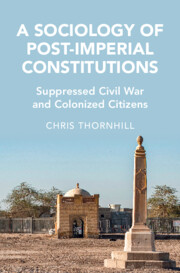Book contents
- A Sociology of Post-Imperial Constitutions
- Cambridge Studies in Law and Society
- A Sociology of Post-Imperial Constitutions
- Copyright page
- Dedication
- Contents
- Acknowledgements
- Introduction
- Chapter One Imperialism and the Origins of Constitutions
- Chapter Two Constitutions and the Persistence of Empires
- Chapter Three Imperialism and Global Civil War
- Chapter Four Imperial Nations in Latin America
- Chapter Five Military Constitutions in and after the Ottoman Empire
- Chapter Six World Law and Occupation Constitutions
- Chapter Seven The Occupation Constitution II
- Chapter Eight The Occupation Constitution III
- Chapter Nine Constitutions after War
- Chapter Ten New Security Constitutions
- Conclusion
- Bibliography
- Index
- Cambridge Studies in Law and Society
Chapter Seven - The Occupation Constitution II
Changing Security Constitutions
Published online by Cambridge University Press: 06 December 2024
- A Sociology of Post-Imperial Constitutions
- Cambridge Studies in Law and Society
- A Sociology of Post-Imperial Constitutions
- Copyright page
- Dedication
- Contents
- Acknowledgements
- Introduction
- Chapter One Imperialism and the Origins of Constitutions
- Chapter Two Constitutions and the Persistence of Empires
- Chapter Three Imperialism and Global Civil War
- Chapter Four Imperial Nations in Latin America
- Chapter Five Military Constitutions in and after the Ottoman Empire
- Chapter Six World Law and Occupation Constitutions
- Chapter Seven The Occupation Constitution II
- Chapter Eight The Occupation Constitution III
- Chapter Nine Constitutions after War
- Chapter Ten New Security Constitutions
- Conclusion
- Bibliography
- Index
- Cambridge Studies in Law and Society
Summary
This chapter builds on the analysis in Chapter 6 and assesses further preconditions for the stabilization of democracy after 1945. Here it focuses on the domestic apparatus of constitutional democracy, arguing that post-1945 systems separated their constitutions from war because they developed increasingly universal welfare states which served to balance the effects of constitutional integration and to soften extreme internal conflicts. It attaches this analysis to a theory of individual integration, stating that modern democracy began with processes of social integration released by warfare and it was only as these processes were directed towards welfare provisions that states were reasonably stable (sovereign). It gives particular weight to education policies in post-1945 welfare democracies.
- Type
- Chapter
- Information
- A Sociology of Post-Imperial ConstitutionsSuppressed Civil War and Colonized Citizens, pp. 372 - 404Publisher: Cambridge University PressPrint publication year: 2024

